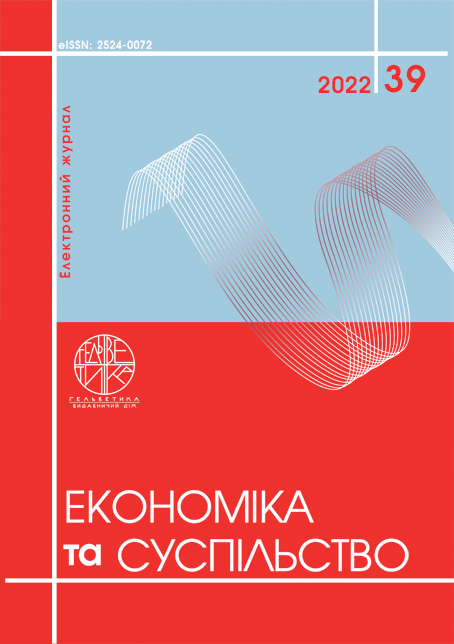SUBSTANTIATION OF THE NEED TO HIGHLIGHT THE IMPACT OF THE WAR IN UKRAINE ON THE ACTIVITIES OF ENTERPRISES IN NON-FINANCIAL REPORTING AND WAYS TO DISCLOSE THIS INFORMATION
Abstract
The purpose of the article is to substantiate the need to highlight the impact of the war in Ukraine on enterprises' non-financial reporting activities, as well as to develop recommendations for the use of GRI standards in the preparation of non-financial reporting. Initially, the authors considered critical approaches to understanding the concept of non-financial reporting. They found that GRI reporting is the world's most common type of non-financial reporting. Such reports are of great value because all their information is verified and trustworthy. Also, the authors of such reports can not miss topics they do not like, so these reports have both positive and negative indicators of the enterprise. Another feature of the GRI report is the procedure for identifying essential topics. It assumes that the report will describe only those topics that are interesting and important for stakeholders. Thus, the topic of the impact of the war in Ukraine in 2022 is essential for any Ukrainian company. The article's authors have developed a list of factors that justify the need to report on the impact of the war in Ukraine. The authors classify these factors for reporting purposes and by the group of stakeholders who will read the report. As part of this study, the authors also tried to find similar cases of reporting on the war in other countries. They were able to find only two specific examples of reporting on the impact of the Karabakh war on the activities of Azerbaijani enterprises. However, these reports describe the effects of the war only in the sections on community service. The article's authors analyzed all GRI standards and selected all those within which it is appropriate to cover an essential topic of the impact of war on entrepreneurship. The authors of the article identified fourteen such standards. The article's authors investigated the average cost of preparing a non-financial report by external consultants. It turned out to be a hefty sum. It is possible that during the war, companies have higher priority items of expenditure than preparing non-financial statements. Therefore, the article's authors have developed a list of alternatives for using GRI standards and reporting in other ways. This study has a long-term perspective because, after the end of the reporting period, it is possible to analyze how Ukrainian enterprises reported on the impact of the war on their activities.
References
Байрактар Ю.П. Нефінансова звітність підприємств та етапи її формування. Вісник ОНУ імені І.І. Мечникова. 2015. Т. 20. Вип. 1/1. С. 57–61.
Гриценко О.І. Тенденції та проблеми формування інтегрованої звітності суб’єктами господарювання. Молодий вчений. 2014. № 2 (05). С. 31–34.
Довга Т. Формування екологічної звітності сміттєпереробних підприємств. Вісник Київського національного університету імені Тараса Шевченка. Економіка. 2012. Вип. 143. С. 50–54.
Закон України від 16.07.1999 р. № 996-XIV «Про бухгалтерський облік та фінансову звітність в Україні». URL: https://zakon.rada.gov.ua/laws/show/996-14#Text (дата звернення: 20.06.2022).
Гречко А.В., Очеретяна О.В. Нефінансова звітність як інструмент підвищення інвестиційної привабливості підприємства. Економіка та суспільство. 2021. Вип. 25. DOI: https://doi.org/10.32782/2524-0072/2021-25-38 (дата звернення: 20.06.2022).
GRI (Global Reporting Initiative). URL: https://www.globalreporting.org/standards/ (дата звернення: 20.06.2022).
SOCAR. Річний звіт про сталий розвиток. 2019. URL: https://socar.az/socar/assets/documents/en/socar-annual-reports/Sustainable%20development%20report-2019.pdf (дата звернення: 20.06.2022).
Азербайджанське Каспійське пароплавство. Звіт про сталий розвиток, 2018-2019. URL: https://www.asco.az/uploads_files/2020/10/27/959631603793949.pdf (дата звернення: 20.06.2022).
Електронна система публічних закупівель Prozorro. URL: https://prozorro.gov.ua/ (дата звернення: 20.06.2022).
Bairaktar Yu.P. (2015) Nefinansova zvitnist pidpryiemstv ta etapy yii formuvannia [Non-financial reporting of enterprises and stages of its formation]. Visnyk ONU imeni I. I. Mechnykova – Bulletin of the II Mechnikov National University, 20, 1/1, 57–61. (in Ukrainian)
Hrytsenko O.I. (2014) Tendentsii ta problemy formuvannia intehrovanoi zvitnosti subiektamy hospodariuvannia – [Trends and problems of integrated reporting by business entities]. Molodyi vchenyi – Young scientist, 2 (05), 31–34. (in Ukrainian)
Dovha T. (2012) Formuvannia ekolohichnoi zvitnosti smittiepererobnykh pidpryiemstv [Formation of ecological reporting of waste processing enterprises]. Visnyk Kyivskoho natsionalnoho universytetu imeni Tarasa Shevchenka – Bulletin of the Taras Shevchenko National University of Kyiv, 143, 50–54. (in Ukrainian)
Law of Ukraine of 16.07.1999 № 996-XIV "On Accounting and Financial Reporting in Ukraine". Retrieved from: https://zakon.rada.gov.ua/laws/show/996-14#Text (in Ukrainian)
Hrechko A.V., Ocheretiana O.V. (2021) Non-financial reporting as a tool to increase the investment attractiveness of the enterprise. Ekonomika ta suspilstvo – Economy and society, 25. DOI: https://doi.org/10.32782/2524-0072/2021-25-38
GRI (Global Reporting Initiative). Retrieved from: https://www.globalreporting.org/standards/
SOCAR (2019) Annual Sustainable Development Report. Retrieved from: https://socar.az/socar/assets/documents/en/socar-annual-reports/Sustainable%20development%20report-2019.pdf
Azerbaijan Caspian Shipping Company. Sustainability Report, 2018 – 2019. Retrieved from: https://www.asco.az/uploads_files/2020/10/27/959631603793949.pdf
Prozorro electronic public procurement system. Retrieved from: https://prozorro.gov.ua/ (in Ukrainian)


